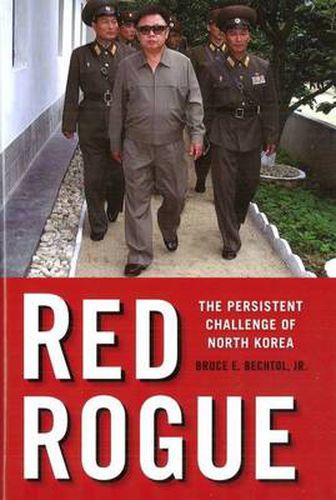Readings Newsletter
Become a Readings Member to make your shopping experience even easier.
Sign in or sign up for free!
You’re not far away from qualifying for FREE standard shipping within Australia
You’ve qualified for FREE standard shipping within Australia
The cart is loading…






In Red Rogue , Bruce Bechtol analyzes the changing nature of North Korea’s national defense, foreign policy, and illicit economic activities in the post - 9/11 era. He describes how North Korea has adapted to a changing global and regional environment to ensure regime survival and has often dictated the agenda in East Asia. Bechtol explains why North Korea frequently resorts to brinkmanship and provocations as foreign policy tools and why North Korea remains a threat to the United States and South Korea. After a detailed discussion of North Korea’s internal politics and foreign policy, Red Rogue examines the diverging U.S. and South Korean assessments of security on the peninsula, the health of the rapidly changing South Korea - U.S. alliance, and the badly deteriorated South Korean civil-military relationship. Using a framework that focuses on diplomatic, informational, military, and economic instruments of national power, the author reveals the dynamic and complicated challenges for security and stability on the Korean Peninsula. The reader will gain a clear perspective of the paradigm shifts in U.S., South Korean, and North Korean policies in recent years. The book is essential reading for scholars, policymakers, military strategists, and anyone who has an interest in East Asian affairs.
$9.00 standard shipping within Australia
FREE standard shipping within Australia for orders over $100.00
Express & International shipping calculated at checkout
In Red Rogue , Bruce Bechtol analyzes the changing nature of North Korea’s national defense, foreign policy, and illicit economic activities in the post - 9/11 era. He describes how North Korea has adapted to a changing global and regional environment to ensure regime survival and has often dictated the agenda in East Asia. Bechtol explains why North Korea frequently resorts to brinkmanship and provocations as foreign policy tools and why North Korea remains a threat to the United States and South Korea. After a detailed discussion of North Korea’s internal politics and foreign policy, Red Rogue examines the diverging U.S. and South Korean assessments of security on the peninsula, the health of the rapidly changing South Korea - U.S. alliance, and the badly deteriorated South Korean civil-military relationship. Using a framework that focuses on diplomatic, informational, military, and economic instruments of national power, the author reveals the dynamic and complicated challenges for security and stability on the Korean Peninsula. The reader will gain a clear perspective of the paradigm shifts in U.S., South Korean, and North Korean policies in recent years. The book is essential reading for scholars, policymakers, military strategists, and anyone who has an interest in East Asian affairs.